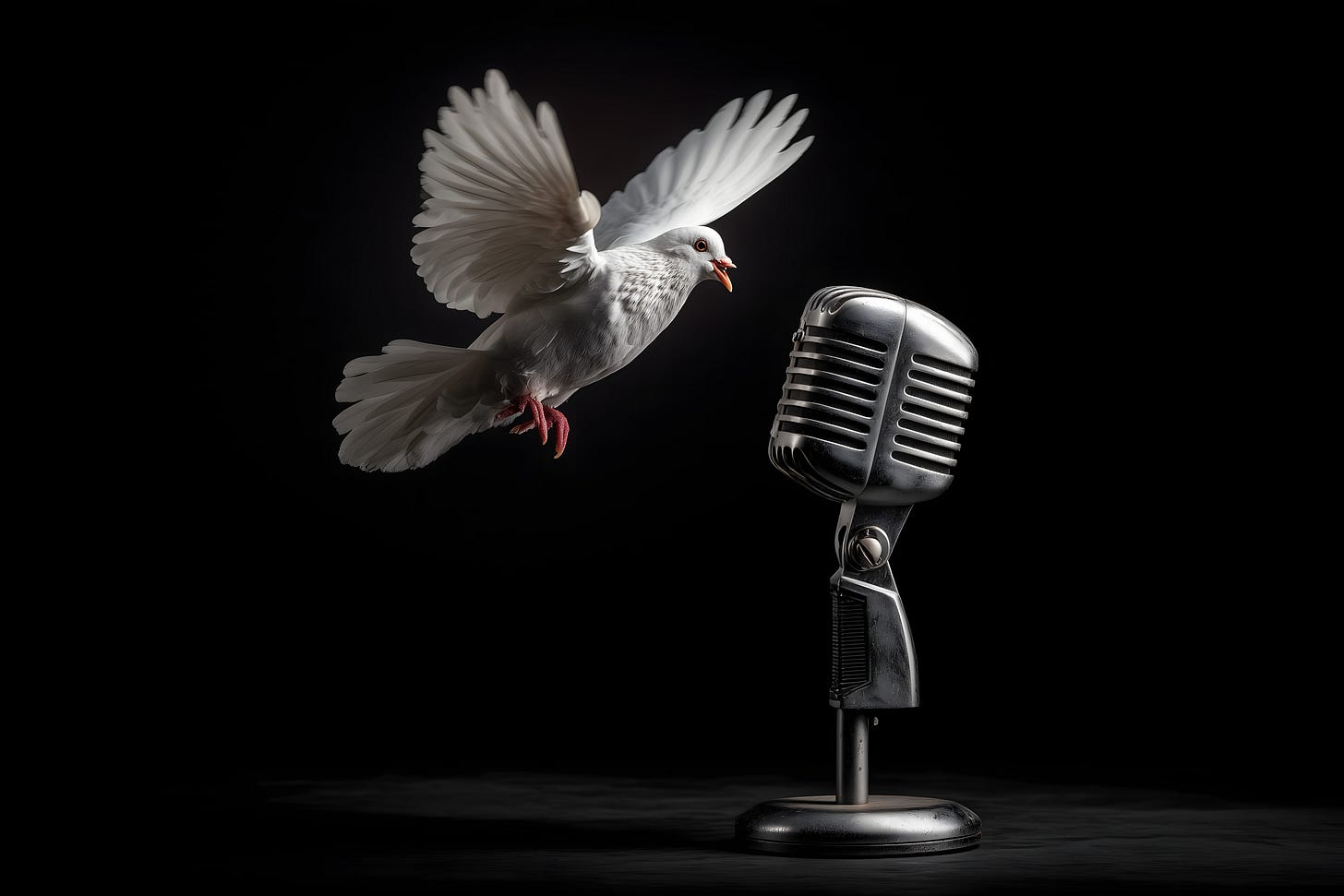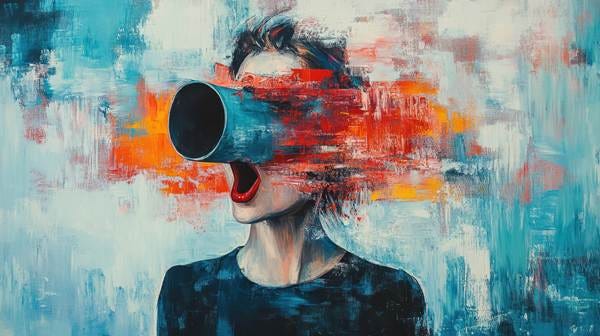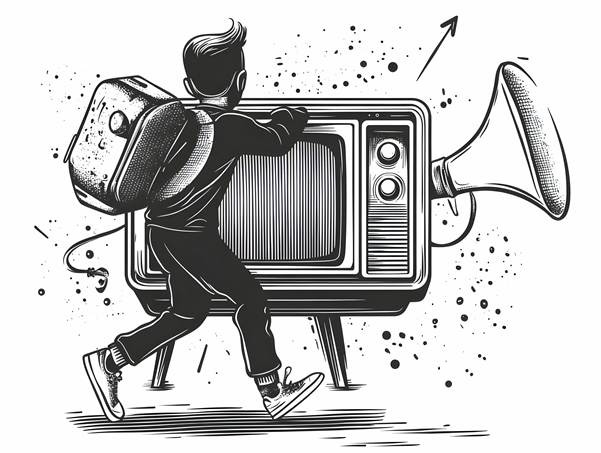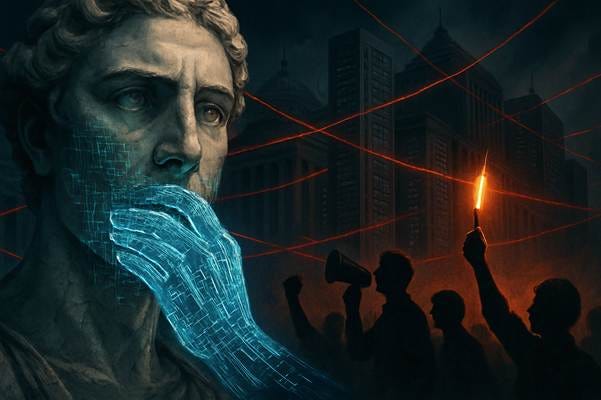
It is difficult to believe, that a year has already passed since my article "Freedom of Speech Under Siege," was published last August (2024). Back then, I warned of a perilous shift in how society perceives and polices speech. The subtle (but sometimes not so subtle) manipulations of the past, have given way to accelerated efforts to control narratives, often under the disguise of protecting the public. Our new ‘daddies’ who decide what is right for us and what is not (the Media - both mainstream and social), wield unprecedented power to redefine what is acceptable and what is not. At the same time, technology and global institutions push us toward a future where dissent is increasingly stifled.
As of July 6, 2025, these trends, unfortunately, have deepened, with new laws, technological advancements, and societal shifts further threatening the essence of free speech. And I am not sure the majority of people realizes what is at stake…
In this follow-up, my intention is to examine recent developments in the United Kingdom, Australia, and beyond, and reflect on whether we are moving toward freedom or a more controlled, dystopian reality.
Developments in Free Speech

In the past year, there has been a mix of efforts to protect and not surprisingly restrict free speech, often cloaked in the language of safety and social good.
A Tightening Grip (United Kingdom)
Let’s start with the UK, where the Online Safety Act 2023, designed to shield users from harmful online content, has raised significant concerns about overreach. The Act mandates that social media platforms remove illegal or harmful material, with a focus on protecting children from age-inappropriate content. Yet, critics, including human rights groups like Article 19, argue it risks becoming a tool for censorship, with a vague definition of "harmful" content which can be used to silence legitimate voices. Other reports suggest that around 30 arrests are taking place daily for online speech deemed offensive. This should create a chilling effect in all of us about where open discussions are heading.
The 2024 summer riots, were triggered after a tragic stabbing in Southport and this event has exposed the challenges of balancing speech and safety. Social media amplified one type of narratives, leading to unrest, with subsequent reports highlighting how outdated laws hinder police efforts to counter “misinformation” swiftly. While it is true that such events point to the need for effective regulation, the response has clearly leaned toward tighter control, with the Free Speech Union offering legal support to those targeted in what appears to be a broader crackdown.
On a positive note, the Higher Education Act 2023, which is set to take effect in August 2025, aims to safeguard academic freedom. The Act requires universities to promote free speech – you know true free speech and not the one promoted by the mainstream narratives, within the law and establishes a complaints scheme for violations, which will hopefully preserve open debate in intellectual spaces. At the same time, this progress is overshadowed by broader restrictions that threaten the very foundation of free expression.
A Struggle for Balance (Australia)
Moving down under, Australia has seen both promising and troubling developments. The proposed Constitution Alteration (Right to Free Speech) 2025 seeks to highlight free speech protections in the constitution, modelled after the U.S. First Amendment. If passed, it would prevent the Commonwealth or States from making laws that limit speech, including press and media freedoms.
However, new hate speech laws enacted in February 2025, aimed at curbing antisemitism, have sparked debate. These laws ban hate symbols and impose minimum sentences for certain offenses. The Law Council of Australia warns they could lead to "serious injustice" if misapplied, with the potential of silencing inconvenient speech. In the same way, the proposed Combating Misinformation and Disinformation Bill has been criticized as a tool for censorship, threatening to suppress dissenting voices under the pretext of fighting “misinformation”.
Technology’s Double-Edged Sword

Technology, particularly artificial intelligence, remains a central force in shaping free speech. AI could become a very powerful social weapon, manipulating narratives and eroding trust in democratic institutions. I mentioned previously that my concern is that technology could steer us toward a dystopian future, where control is centralized and individual voices are marginalized. Unfortunately, we are moving more and more in that direction.
The World Economic Forum’s 2025 meeting, themed "Collaboration for the Intelligent Age," emphasized ethical AI development and advocated for global frameworks to govern technologies such as AI and blockchain.
However, the word "ethical," as used by the WEF, is not always particularly... ethical.
So, while it is true that this meeting signals a commitment to responsible innovation, it also raises questions about who defines "ethical" and whether these frameworks will prioritize freedom or control. AI-driven content moderation, already widespread on social platforms, risks over-censoring legitimate speech, especially when algorithms lack transparency or cultural relevance.
Societal Decay and the Psychiatric Ward
As I warned last year, our society increasingly resembles a vast psychiatric ward, where behaviours once considered destructive are normalized. Mental health has gained prominence, with over 50% of Gen Z favouring brands that address it, a 33% rise in three years. Yet, access to care remains limited, with stigma, poverty, and digital divides exacerbating the crisis.
This reflects a broader moral decay, where narcissism, sadism, and online abuse flourish, often unchecked, as individuals project their inner turmoil onto others.
The Overton window continues to shift, normalizing what was once unthinkable while vilifying traditional values like family or faith. This deliberate polarization, amplified by media and technology, fuels division, making it easier for unseen forces to manipulate and control. The 2024 riots and ongoing online vitriol are symptoms of this deeper malaise, signalling a society on the brink of further unrest if we do not act.
What Lies Ahead?
There is no doubt that the trends of the past year confirm that the erosion of free speech is not random but part of a broader strategy, reminiscent of the "divide and conquer" tactics I highlighted previously.
The puppet masters, whether global institutions like the WEF or tech giants, continue to shape narratives, under the pretext of progress or safety. Klaus Schwab’s ominous warning about the need for improved global institutions to avoid a "dangerous" world hints at a top-down solution that could lead to greater centralization. Harari’s vision of a "useless class" marginalized by technological advances further underscores the stakes.
Yet, there is hope. Grassroots efforts, like Australia’s constitutional push and the UK’s academic protections, show that resistance is possible. The solution lies in education, critical thinking, and collective action to promote unity and resilience against manipulation. We must reject passivity. We have to engage in open dialogue, and demand transparency from those who control our platforms and laws.
The alternative, is a society where dissent is silenced and truth is dictated, and it is too grim to contemplate.
Conclusion
The battle for free speech is intensifying. Yes, some victories like proposed constitutional protections in Australia offer some hope. However, threats from restrictive laws and AI-driven censorship loom large. As I warned a year ago, we risk losing the essence of a free society if we allow these trends to continue unchecked. The normalization of destructive behaviours and the vilification of basic values signal a deeper moral crisis, one that requires us to act decisively at a personal and at a societal level.
At the end, it all depends on us, each individual, each voice, each choice. Passivity is not an option; our freedom hangs in the balance.




An excellent summary of the situation, thanks!